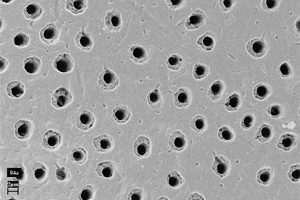October 10, 2016
Tooth sensitivity is due to the exposure of dentin, the part of the tooth which covers the nerve, either through loss of the enamel layer or recession of the gums. Temperature changes and certain foods (acidic or sweet) can cause the tooth or teeth to be painful. The pain usually subsides after a short period of time.
The dentin contains a large numbers of pores or tubes that run from the outside of the tooth to the nerve in the center. When the dentin is exposed, these tubes can be stimulated by changes in temperature or certain foods. Here is an image of what the dentin tubes look like under the microscope:
 The best way to find out why a tooth is sensitive is to have dental professional examine you. They can look for the signs of dentin exposure, and run tests to determine what the true cause of the sensitivity is. Sometimes, the sensitivity is due to a cavity or gum disease – these can be treated to address the sensitivity. Other times, the cause of the sensitivity is because the enamel has been lost through abrasion or erosion, or the gums have receded, causing the roots to be exposed.
The best way to find out why a tooth is sensitive is to have dental professional examine you. They can look for the signs of dentin exposure, and run tests to determine what the true cause of the sensitivity is. Sometimes, the sensitivity is due to a cavity or gum disease – these can be treated to address the sensitivity. Other times, the cause of the sensitivity is because the enamel has been lost through abrasion or erosion, or the gums have receded, causing the roots to be exposed.
What Can Be Done?
If the sensitivity is due to a cavity, a restoration can be placed. If gum disease is the cause, the dental professional can perform a thorough cleaning of the area.
However, if the cause is from dentin being exposed, then there are a number of professional and at home treatments that can be used to reduce the sensitivity.
In Office Procedures:
- Fluoride varnish can be applied to exposed areas, strengthening the enamel and dentin
- Fluoride foam or gel can be placed into a mouth tray; you then sit with this in your mouth for 3-5 minutes, providing the teeth with a high concentration of fluoride to strengthen the areas
- Bonding agent, the material used to stick tooth colored restorations to teeth, can be used to seal the dentin surface and provide a barrier to the stimuli that cause sensitivity
At Home:
- Use a very soft bristle tooth brush, with low abrasive tooth paste
- Brush correctly and do not over brush
- Use a tooth paste specially formulated to soothe the nerve endings in the tooth
- Use a high concentration fluoride toothpaste (given to you by the dental professional) to strengthen the tooth surface
There are a number of treatments available, and your dental professional in Hollywood, FL can help you find those that will work best, depending on your situation. Always seek a dental professional's help – do not try to diagnose this problem yourself. It may be the sign of something more serious, and only a dental professional can tell you what it really is.
colgate.com
Testimonials
Great staff I was nervous but they made me feel at ease. I am confident that they will give me the smile that I airways wanted. The receptionist personality is...
Uuggh uggh (West Palm Beach, FL)
I am usually very scared of dentists and specially surgery but today Dr. Gorbatov and his wonderful team made the experience go seamless and they are very professional and knowledgeable...
Marlene Girard
I really hate having to go to the dentist. And I was very nervous about having an amalgam removed to work on a tooth with bad cavities. I came specifically...
Heather Valmy
Amazing experience! The office is beautiful, the staff is knowledgeable and super friendly.
Maria Slomka
Excellent staff and the doctor!It took me almost 2 years to find a qualified doctor who will insert two zirconium implants. Dr Gorbachev took his time to explain me the...
Monica Nowak
My experience, couldn’t ask for any better, great office, wonderful people. Professional in his field, with pleasant energy in his office Dr. Gorbatov and all his team members where AWESOME!!...
William Hunt
I have been having a lot of issues with my teeth for quiet some time, including broken molars and bad procedures at other dental facilities. I came to Dr. Gorbatov...
Felix Spengler (Miami, FL)
Jessica at the front has helped me tremendously and the Dr has made the large amount of work that I have had done painless